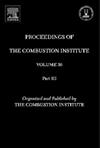Effect of oxygen concentration, pressure, and opposed flow velocity on the flame spread along thin PMMA sheets
IF 5.3
2区 工程技术
Q2 ENERGY & FUELS
引用次数: 0
Abstract
The flame spread of thin PMMA sheets has been studied both in opposed configuration under microgravity (9.3 s drop tower) and in downward configuration under normal gravity conditions. The position of the flame front has been determined with the help of an infrared camera. Propagation rates have been measured over a range of 30–200 mm/s forced opposed flow (only microgravity), 60–101.3 kPa ambient pressure, and oxygen concentrations of 21–35.4 vol. %, which corresponds to real environmental conditions on spacecraft. In addition to variations along the normoxic curve with constant oxygen partial pressure, the parameters oxygen and pressure were examined independently of each other in order to be able to determine their respective effects. The variation of the flow velocity was carried out at 60 kPa and 35.4 vol. % oxygen. The results for both microgravity and normal gravity are discussed separately on the basis of the respective atmospheric effect. Along the normoxic curve, a significant increase in the flame spread rate was found with increasing oxygen concentration and correspondingly decreasing pressure. This results in a significant increase in the risk of fire with regard to future exploration missions. The effect of the flow velocity cannot be neglected in the investigated velocity range and was linked to the influencing parameters in a correlation. Based on this parameterization, a linear function is given that reflects both the downward and the opposed results well. This function can be used to predict the flame spread in the given parameter space. Under normal gravity, the tested samples show a slightly increased propagation rate in most cases. This can essentially be attributed to the difference in velocity between the buoyant flow and the forced flow in µg.氧气浓度、压力和对流速度对火焰沿 PMMA 薄板蔓延的影响
研究了 PMMA 薄板在微重力(9.3 秒落塔)和正常重力条件下在向下配置时的火焰蔓延情况。借助红外摄像机确定了火焰前沿的位置。在 30-200 mm/s 强制对流(仅微重力)、60-101.3 kPa 环境压力和 21-35.4 vol. % 氧气浓度范围内测量了传播率,这与航天器上的实际环境条件相符。除了沿着氧分压恒定的常氧曲线进行变化外,还对氧气和压力参数进行了独立研究,以确定它们各自的影响。流速的变化是在 60 kPa 和 35.4 Vol.微重力和正常重力下的结果根据各自的大气效应分别进行了讨论。在常氧曲线上,随着氧气浓度的增加和压力的相应降低,火焰蔓延率显著增加。这导致未来勘探任务的火灾风险大大增加。在所研究的速度范围内,流速的影响不容忽视,并与影响参数相关联。在此参数化的基础上,给出了一个线性函数,很好地反映了向下和相反的结果。该函数可用于预测给定参数空间内的火焰蔓延。在正常重力条件下,测试样品在大多数情况下都显示出略微增加的传播速度。这主要归因于浮力流和强制流之间的速度差异(以 µg 为单位)。
本文章由计算机程序翻译,如有差异,请以英文原文为准。
求助全文
约1分钟内获得全文
求助全文
来源期刊

Proceedings of the Combustion Institute
工程技术-工程:化工
CiteScore
7.00
自引率
0.00%
发文量
420
审稿时长
3.0 months
期刊介绍:
The Proceedings of the Combustion Institute contains forefront contributions in fundamentals and applications of combustion science. For more than 50 years, the Combustion Institute has served as the peak international society for dissemination of scientific and technical research in the combustion field. In addition to author submissions, the Proceedings of the Combustion Institute includes the Institute''s prestigious invited strategic and topical reviews that represent indispensable resources for emergent research in the field. All papers are subjected to rigorous peer review.
Research papers and invited topical reviews; Reaction Kinetics; Soot, PAH, and other large molecules; Diagnostics; Laminar Flames; Turbulent Flames; Heterogeneous Combustion; Spray and Droplet Combustion; Detonations, Explosions & Supersonic Combustion; Fire Research; Stationary Combustion Systems; IC Engine and Gas Turbine Combustion; New Technology Concepts
The electronic version of Proceedings of the Combustion Institute contains supplemental material such as reaction mechanisms, illustrating movies, and other data.
文献相关原料
| 公司名称 | 产品信息 | 采购帮参考价格 |
|---|
 求助内容:
求助内容: 应助结果提醒方式:
应助结果提醒方式:


